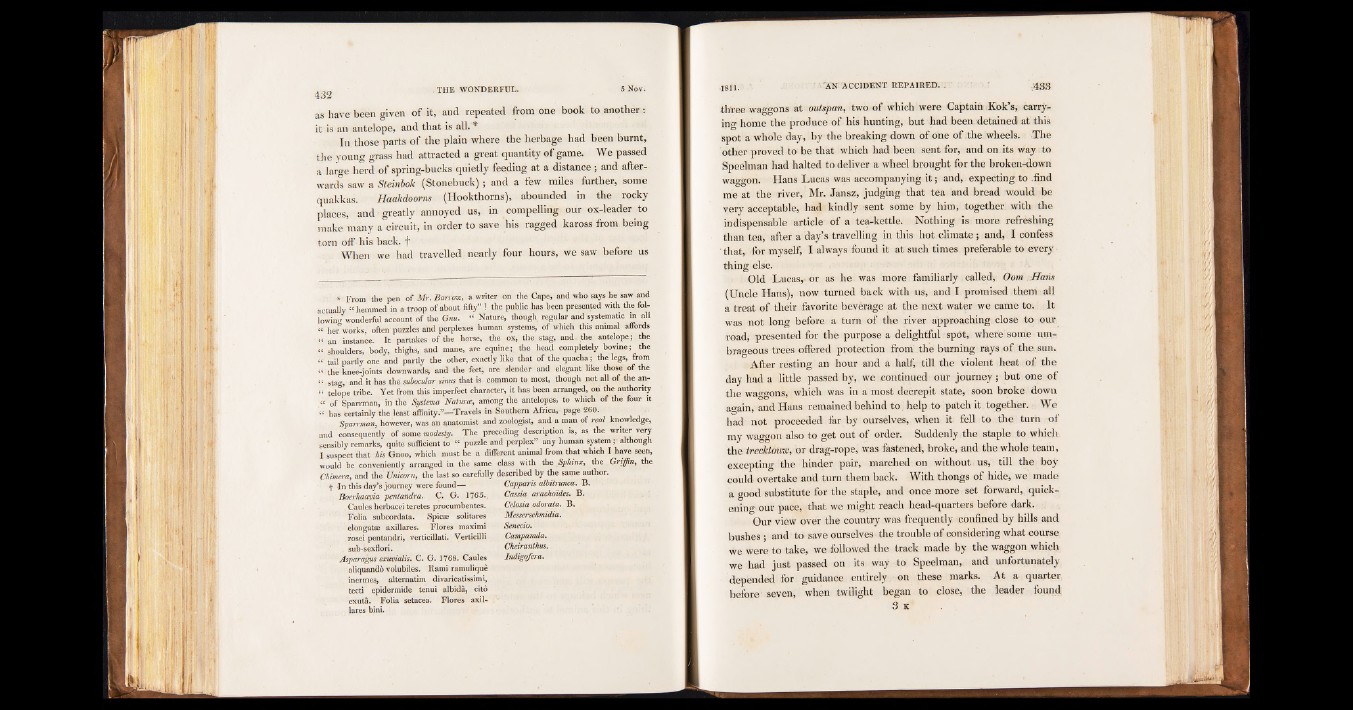
, M THE WONDERFUL. 5 Nov. 432
as have been given of it, and repeated from one book to another:
it is an antelope, and that is all.*
In those parts of the plain where the herbage had been burnt,
the young grass had attracted a great quantity of game. We passed
a larcre herd of spring-bucks quietly feeding at a distance; and afterwards
saw a Steinbok (Stonebuck); and a few miles further, some
quakkas. Haakdooms (Hookthorns), abounded in the rocky
places, and greatly annoyed us, in compelling our ox-leader to
make many a circuit, in order to save his ragged kaross from being
torn off his back, f
When we had travelled nearly four hours, we saw before us
* From the pen of Mr. Barra®, a writer on the Cape, and who says he saw and
actually “ hemmed in a troop of about fifty” ! the public has been presented with the following
wonderful account of the Gnu. “ Nature, though, regular and systematic m all
« her*works, often puzzles and perplexes human systems, of which this animal affords
« an instance. It partakes of the horse, the ox, the stag, and. the antelope; the
« shoulders, body, thighs, and mane, are equine;, the head completely bovme; the
« tail partly one and partly the other, exactly like that of thequacha ; the legs, from
« the knee-joints downwards-, and the feet, are slender and elegant like those of the
“ stag, and it has thè subocular sinus that is common to most, though not all of the ah-
« telope tribe. Yet from this imperfect character, it has been arranged, on the authority
« of Sparnnan, in the Systema Natura, among the antelopes, to which of the four it
“ has certainly the least affinity.”—Travels in Southern Africa, page 260.
Sparrman, however, was an anatomist and zoologist, and a man of real knowledge,
and consequently of some modesty. The preceding description is, as the writer very
sensibly remarks, quite sufficient to « puzzle and perplex” any human system ;• although
I suspect that his Gnoo, which must be a different animal from that which I have seen,
would be conveniently arranged in the same class with the Sphinx, the Griffin, the
Chimera, and the Unicorn, the last so carefully described by the same author,
f -In this day’s journey were found— Capparis albitrunca. B.
Boerhaavia pentandra. C. G. 1765.. Cassia arachoides. B.
Caules herbacei teretes procumbentes. . Ceiosia .odorata. B.
Folia subcordata. Spicse solitares Messerschmidia.
elongatae axillares. Flores maximi Senecio.
rosei pentandri, verticillati. Verticilli Campanula.
. sub-sexflori. Cheiranthus.
Asparagus exicoialis. C. G. 1768. Caules Jndigofera.
aliquandò volubiles. Rami ramuliquè
inermes, alternatim divaricatissimi,
tecti epidermide tenui albidà, citò
exuta. Folia setacea. Flores axillares
bini.
three waggons at outspan, two of which were Captain Kok’s, carrying
home the produce of his hunting, but had been detained at this
spot a whole day, by the breaking down of one of the wheels. The
other proved to be that which had been sent for, and on its way to
Speelman had halted to deliver a wheel brought for the broken-down
waggon. Hans Lucas was accompanying i t ; and, expecting to .find
me at the river, Mr. Jansz, judging that tea and bread would be
very acceptable, had kindly sent some by him, together with the
indispensable article of a tea-kettle. Nothing is more refreshing
than tea, after a day’s travelling in this hot climate ; and, I confess
that, for myself, I always found it at such times preferable to every
tiling else.
Old Lucas,-or as he was more familiarly called, Oom Haris
(Uncle Hans), now turned back with us, and I promised them all
a treat of their favorite beverage at the next ;water we came to. It
was not long before a turn of the river approaching close to our
road, presented for the purpose a delightful spot, where some umbrageous
trees offered protection from the burning rays of the sun.
After resting an hour and a half, till the violent heat of the
day had a little passed by, we .continued our journey; but one of
the waggons, which was in a most decrepit state, soon broke down
again, and Hans remained behind to help to patch it together. We
had not proceeded far by ourselves, when it fell to the turn of
my waggon also to get out of order. Suddenly the staple to which
the trecktouw, or drag-rope, was fastened, broke, and the whole team,
excepting the hinder pair, marched on without us, till the boy
could overtake and turn them back. With thongs of hide, we made
a good substitute for the staple, and once more set forward, quickening
our pace, that we might reach head-quarters before dark.
Our view over the country was frequently confined by hills and
bushes ; and to save ourselves the trouble of considering what course
we were to take, we followed the track made by the waggon which
we had just passed on its way to Speelman, and unfortunately
depended for guidance entirely on these marks. At a quarter
before' seven, when twilight began to close, the leader found
3 K